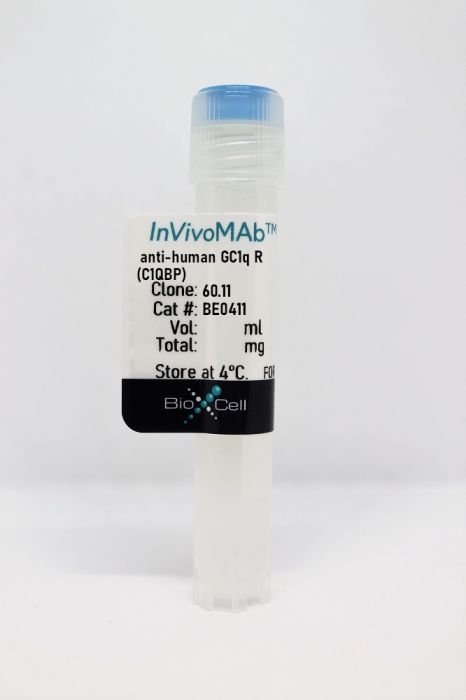InVivoMAb anti-human GC1q R (C1QBP)
Catalog #BE0411
Clone:
60.11
Reactivities:
Mouse, Human, Rat
Product Details
The 60.11 monoclonal antibody reacts with the mature form of gClq R from human, mouse, and rat species. This antibody detects the monomeric and dimeric forms of gClq R, but it does not bind gClq-R’s truncated form which lacks residues 74-95. gClq R, also called p32 or HABP1, has been identified as the major cellular binding site for complement component 1q (C1q). gClq R has a molecular weight of 33 kDa, and is a highly anionic protein that shows ubiquitous expression with predominant localization to the mitochondrial matrix of cells. gClq R has also been shown to localize to the cell surface as well as some cellular organelles, such as the endoplasmic reticulum and nucleus. The expression of gClq-R has been reported to be upregulated in epithelial cancers (e.g., mammary cancer, colorectal cancer, and pulmonary cancers). In tumors, the gC1q R protein has been shown to be released into the tumor microenvironment, where it regulates cancer cell proliferation and metastasis through activation of the complement and the kinin-kallikrein system (KKS) signaling pathways. In vitro studies have shown an induction in the expression of gClq R in normal cells (e.g., blood platelets, endothelial cells) responding to reparative and inflammatory stimuli. In vitro pretreatment with the 60.11 antibody has been shown to inhibit the complement component C1q-induced adhesion and spreading of endothelial cells. In vivo blockade of gC1q R with the 60.11 antibody has been shown to reduce Staphylococcus aureus colonization of target tissues in a rat model of infective endocarditis. In experiments involving a mouse model of orthotropic triple-negative breast cancer xenograft, in vivo blockade of gC1q R with a 60.11 antibody is shown to decrease the growth of the tumors. Like PD-1 and PD-L1 signaling, studies involving the interaction between cancer cells expressed C1q and cytotoxic T cells positive for gC1qR have suggested the C1q and gC1qR axis as a checkpoint inhibitor in cancer immunotherapy.Specifications
| Isotype | Mouse IgG1, κ |
|---|---|
| Recommended Isotype Control(s) | InVivoMAb mouse IgG1 isotype control, unknown specificity |
| Recommended Dilution Buffer | InVivoPure pH 7.0 Dilution Buffer |
| Conjugation | This product is unconjugated. Conjugation is available via our Antibody Conjugation Services. |
| Immunogen | Purified mature form of gClq-R (residues 74-282) |
| Reported Applications |
in vivo blockade of gC1q R in vitro blockade of gC1q R in vitro functional assays Flow cytometry Immunohistochemistry (paraffin) Immunofluorescence Immunoprecipitation Western blot ELISA |
| Formulation |
PBS, pH 7.0 Contains no stabilizers or preservatives |
| Endotoxin |
<2EU/mg (<0.002EU/μg) Determined by LAL gel clotting assay |
| Purity |
>95% Determined by SDS-PAGE |
| Sterility | 0.2 µm filtration |
| Production | Purified from cell culture supernatant in an animal-free facility |
| Purification | Protein G |
| Molecular Weight | 150 kDa |
| Storage | The antibody solution should be stored at the stock concentration at 4°C. Do not freeze. |



